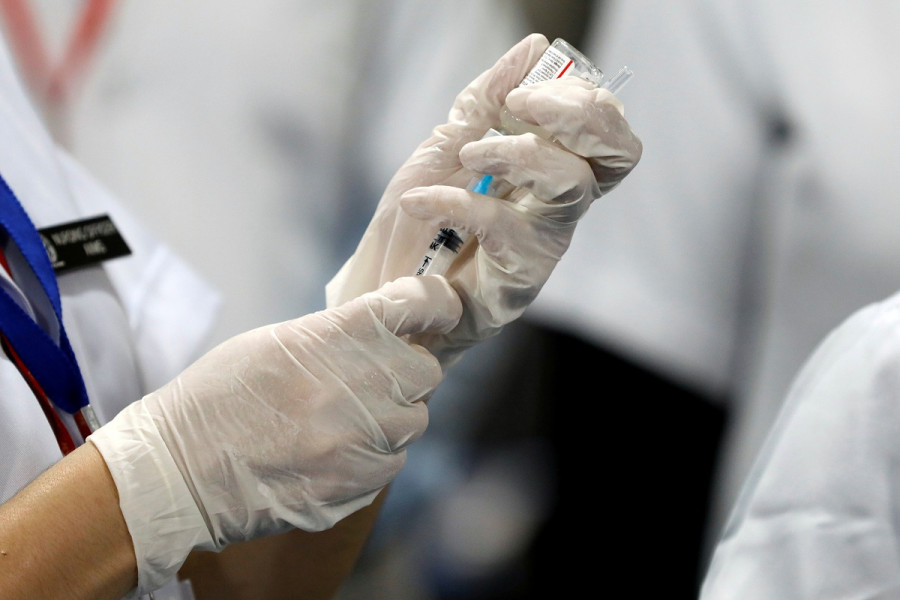Health
Campaign launched to give Covid jabs to half a million people a day
Plan comes amid calls for booster shots, which authorities say will start in about two weeks.
Arjun Poudel
The Ministry of Health said on Tuesday it has launched a campaign to vaccinate at least 500,000 people a day.
To meet the target, different kinds of strategies will be used, officials said.
“Vaccination centers will be set up as per the need,” said Dr Samir Kumar Adhikari, joint spokesperson for the Ministry of Health and Population. “The decision has been taken keeping in mind the risk of spread of new variants of the virus and a surge in cases of the existing Delta variant.”
Delta has been the dominant coronavirus variant in Nepal, just as Omicron, the new iteration of the coronavirus, is spreading across the world and in neighbouring India, which recorded at least 653 cases, with Maharashtra and Delhi reporting 167 and 165 cases respectively.
And the New Delhi government has jumped into action announcing new restrictions under the yellow alert for Covid starting Tuesday. As per the new restrictions, educational institutions will be shut, not more than 20 people will be allowed to participate in weddings and funerals, and public transport vehicles will be allowed to carry passengers only 50 percent of their seating capacities. Cinemas, gyms and spas will be shut. Religious shrines will remain open but devotees will not be allowed to enter, according to Indian media reports.
Nepal so far has reported three Omicron cases, and two of the patients have already tested negative.
The Health Ministry’s plan to inoculate 500,000 people every day also comes amid an announcement that booster shots would be rolled out once 40 percent of the over 30 million population, or around 12,000,000 people, are jabbed. The target is expected to be met within two weeks.
Officials say the ministry aims to vaccinate 500,000 people every day for 15 days, which will mean inoculating 7,500,000.
“We have enough doses to vaccinate these many people,” said an official.
As of now, 10,229,144 people, or 33.7 percent of the total population, have been fully vaccinated in Nepal.
Nepal so far has received 39,203,927 doses of various Covid-19 vaccines—Vero Cell, AstraZeneca, Moderna, Janssen and Pfizer-BioNtech.
Estimates suggest there are 13 million doses in stock.
Officials plan to set up more than 15,000 vaccination centres to meet the 500,000 target.
“We plan to set up around 16,000 vaccination centres and health workers will be deployed in communities as well with vaccines, where the number of unvaccinated population is huge,” said Adhikari. “If we could administer vaccines to the said number in 15 days, we could lessen the risk of severity and deaths from new infections.”
Nepal needs to vaccinate 78 percent of its total population, or 23,400,000 people. Since 4-5 million people are said to be living abroad, over 19 million people need to be vaccinated.
If the government manages to jab 500,000 people a day for 15 days, Nepal will be close to meeting its target of vaccinating all.
On Monday, 568,319 people throughout the country were inoculated. But the number declined on Tuesday to 283,265 only.
Officials said data from all vaccination centers might not have been updated due to which the number of the vaccinated people was around half of that than on Monday.
The ministry has also urged all medical colleges and hospitals having 50 beds and more to provide Covid-19 vaccination services to people above 18 years old in coordination with the district health offices.
It is for the first time the ministry has urged medical colleges and hospitals having 50 beds and more to run Covid-19 vaccination campaign.
Meanwhile, the Health Ministry said that COVAX, the United Nations backed international vaccine-sharing scheme, on Tuesday, delivered syringes and diluent for Pfizer vaccine.
Nepal received 664,560 doses of Pfizer-BioNTech vaccine, donated by the United States through COVAX on Friday.
But syringes were not delivered along with the vaccines, officials had told the Post.
Health authorities on Monday decided to put on hold their plan to vaccinate children aged 12-17 with the Pfizer-BioNTech vaccine, saying there were no syringes in stock.
A 0.5ml auto-disable syringe is used for other vaccines while a 0.3ml syringe is needed for Pfizer-BioNTech.
Health authorities were planning to vaccinate children aged 12-17 in eight districts including the three districts of Kathmandu Valley from Tuesday.
“We received the syringes and diluent today [Tuesday],” said Adhikari. “Vaccination will start in the next few days.”
Nepal launched its vaccination drive on January 27 with the 1 million doses of Covishield, the AstraZeneca type vaccine manufactured by the Serum Institute of India, provided by India in grant.
More vaccines are set to arrive soon, and experts have stressed the need for ensuring that there are enough syringes to continue the vaccination campaign without any hitch.
Officials say delivery of 10 million doses of Covid-19 vaccines—6 million doses of Pfizer-BioNTech and 4 million doses of Moderna—is expected very soon.
The government has purchased the said doses from the US firms using the World Bank’s loan.
“Vaccines will not be a problem to administer to all eligible people for now,” said Sagar Dahal, chief of National Immunisation Programme. “People who have not yet received the jabs should take one from their nearby vaccination centres.”




 19.66°C Kathmandu
19.66°C Kathmandu















